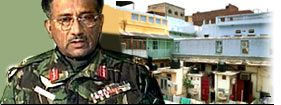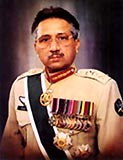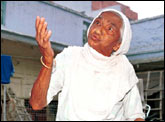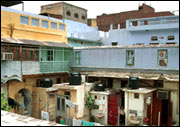The Rediff Special/ Basharat Peer


Near Golcha cinema in Delhi's Daryaganj, you turn into Pratap Street, a congested by-lane once known as Kucha Saadullah Khan.
Unplanned multi-storeyed buildings, housing mostly Hindus and Sikhs who came as refugees from Pakistan during Partition, line it.
Further down you find what was once a majestic old house, Nahar Wali Haveli. It had belonged to a wazir [prime minister] of the last Mughal emperor, Bahadur Shah Zafar who held court in the 18th century. Today it houses two Hindu families from Pakistan.
A few dusty old scooters and motorbikes are parked in the courtyard. There is a dhobi going about his work. Outside, adjacent to the building, is the Gola market.
There are no children playing in the courtyard. Not now.
But some 50 years ago? There could have been -- at least one.
We know for sure that a child was born here a few years before Partition. The house had then belonged to Qazi Mohatsimmudin, a retired commissioner of undivided Punjab.
After Partition, the boy moved with his father Syed Musharrafuddin, a cashier in the Directorate General of Civil Supplies in Delhi, to Pakistan. Musharrafuddin was absorbed in the Pakistan Foreign Service.
 And the boy, Pervez, attended the Saint Patrick's High School, Karachi, and Forman Christian College, Lahore. He joined the Pakistan Military Academy in 1961, and was commissioned three years later. He won an Imtiazi Sanad [a certificate of distinction] for gallantry in the 1965 war.
And the boy, Pervez, attended the Saint Patrick's High School, Karachi, and Forman Christian College, Lahore. He joined the Pakistan Military Academy in 1961, and was commissioned three years later. He won an Imtiazi Sanad [a certificate of distinction] for gallantry in the 1965 war.
Trained as a commando, Pervez -- or General Musharraf, as we know him today -- served seven years in the Special Service Group. On October 7, 1998, he was appointed Pakistan's chief of army staff.
Next year, on October 12, he deposed his prime minister Nawaz Sharief in a bloodless coup and took over as Pakistan's chief executive.
The boy from Nahar Wali Haveli is now expected in India for talks with Prime Minister Atal Bihari Vajpayee. The young and the old alike in Pratap Street knows the general's haveli [house] and are hoping he will visit it.
Twelve-year-old Piyush, brimming with what his grandmother has told him, tells you: "There was a small naher [stream] running in the compound. Begum sahiba wahaan nahaatein thein [the ladies of the house used to bathe their]."
 Seated on the pavement leading to Musharraf's ancestral house, Anaro, at least 80 years old, smiles when you mention the general. She used to be a maid in his house.
Seated on the pavement leading to Musharraf's ancestral house, Anaro, at least 80 years old, smiles when you mention the general. She used to be a maid in his house.
"Khoob jaantee hoon, Musharraf ko [I know Musharraf very well]," she says, emphasising every syllable.
"I know his elder brother as well. They were very decent kids. They used to call me 'Kashmiro', but my name was changed after marriage," Anaro adds.
When Musharraf's family migrated, one of his uncles, Abdul Khalid, stayed back. Living in Kale Mahal, another locality in Old Delhi, he ran a bookshop, Azad Kitab Ghar, in Urdu Bazaar near Jama Masjid, the grand mosque that Shah Jahan built.
"Khalidbhai never talked about his relatives in Pakistan. When Musharraf took over, we came to know about Khalidbhai's relation with him. But nothing changed... he continued to sell books," says Khaleel Ahmed, a barber whose shop faces Azad Kitab Ghar.
"Khalidbhai died some months ago. Azad Kitab Ghar is closed now. He never married, he lived alone," Ahmed sighs, his blank eyes fixed on the rusted iron shutter of Khalid's shop.
Is there anyone else related to General Musharraf? Khaleel Ahmad rubs his double chin hard.
"Yes, I remember," he replies, "Khalidbhai would talk about somebody in Faridabad [in Haryana]. He is with the railways there. But I do not know his name. And there are some people at Aligarh [Muslim University]."
 The shopkeepers in Urdu Bazaar too, like the neighbours in Pratap Street, hope that Musharaff will visit them.
The shopkeepers in Urdu Bazaar too, like the neighbours in Pratap Street, hope that Musharaff will visit them.
Anaro, for her part, is sure that the general will come over. "The one who has gone away will certainly come back," she says.
Would she recognise him? "Even now when you talk of him, I can see his face in front of my eyes," she replies. "He would have changed a lot but I will recognise him."
You ask her about Musharraff's coup. "It hit me hard. I was in tears," Anaro says, "After all I have eaten their salt. Mera toh khoon bud gaya hai tab se [New blood is coursing through my veins since then]."
Design: Lynette Menezes
The Rediff Specials